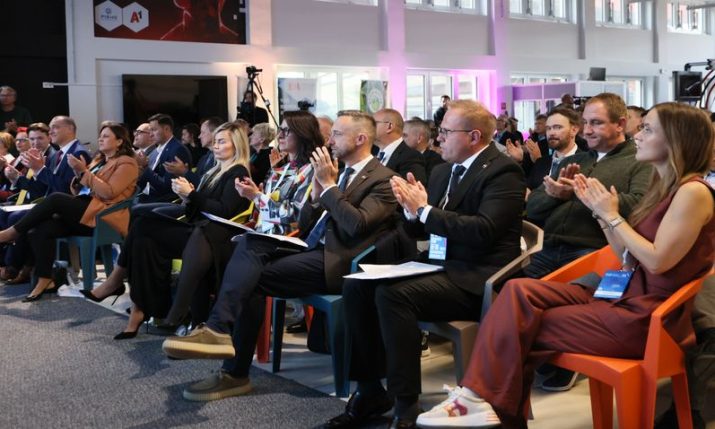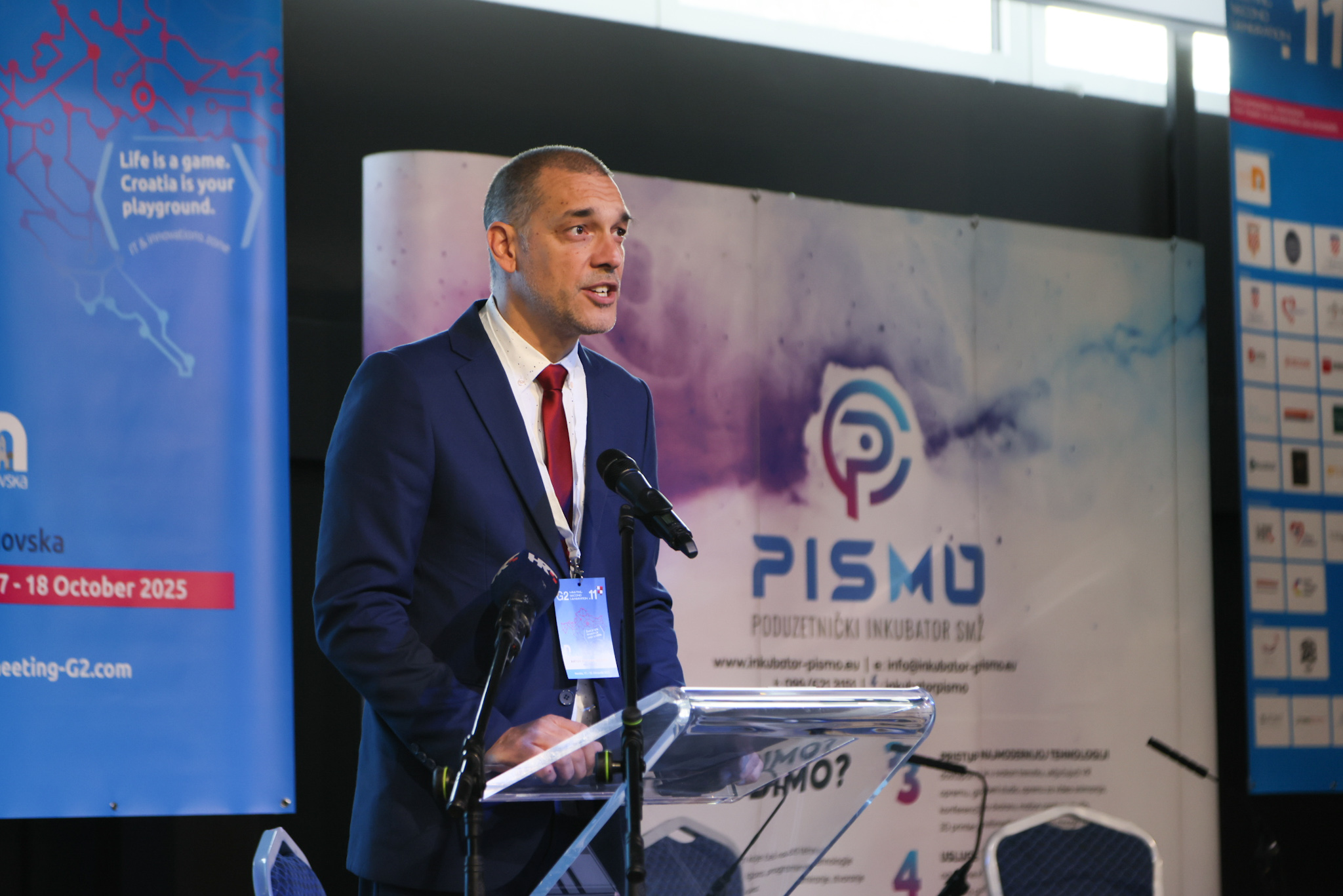
Antun Krešimir Buterin
From gaming to artificial intelligence – the Meeting G2 conference brings together Croatia’s homeland and diaspora to build bridges of knowledge, investment, and unity.
Under the slogan “Life is a game – Croatia is your playground”, entrepreneurs and professionals from Croatia and abroad gathered to share a vision of joint growth through innovation, investment, and the return of knowledge to the homeland.
NOVSKA, 17 October 2025 – The town of Novska, the heart of Croatia’s gaming industry, has hosted the 11th international business conference Meeting G2.11.
For more than a decade, this platform has been systematically connecting entrepreneurs and professionals from Croatia and the Croatian diaspora, with the goal of strengthening economic and cultural ties.
Under the motto “Life is a game – Croatia is your playground”, more than 250 participants from Croatia and across the diaspora – from Switzerland and Germany to the United States, Canada, Australia, and South America – discussed opportunities for investment, innovation, and the transfer of knowledge back to Croatia.
Among the participants were also 50 students from 15 countries – including Argentina, Bolivia, Brazil, Colombia, Chile, Peru, the United States, the United Kingdom, Germany, and Japan – who came to Croatia to learn the language and, during the conference, had the chance to explore the country’s most advanced technological sectors, from gaming to drones and artificial intelligence.
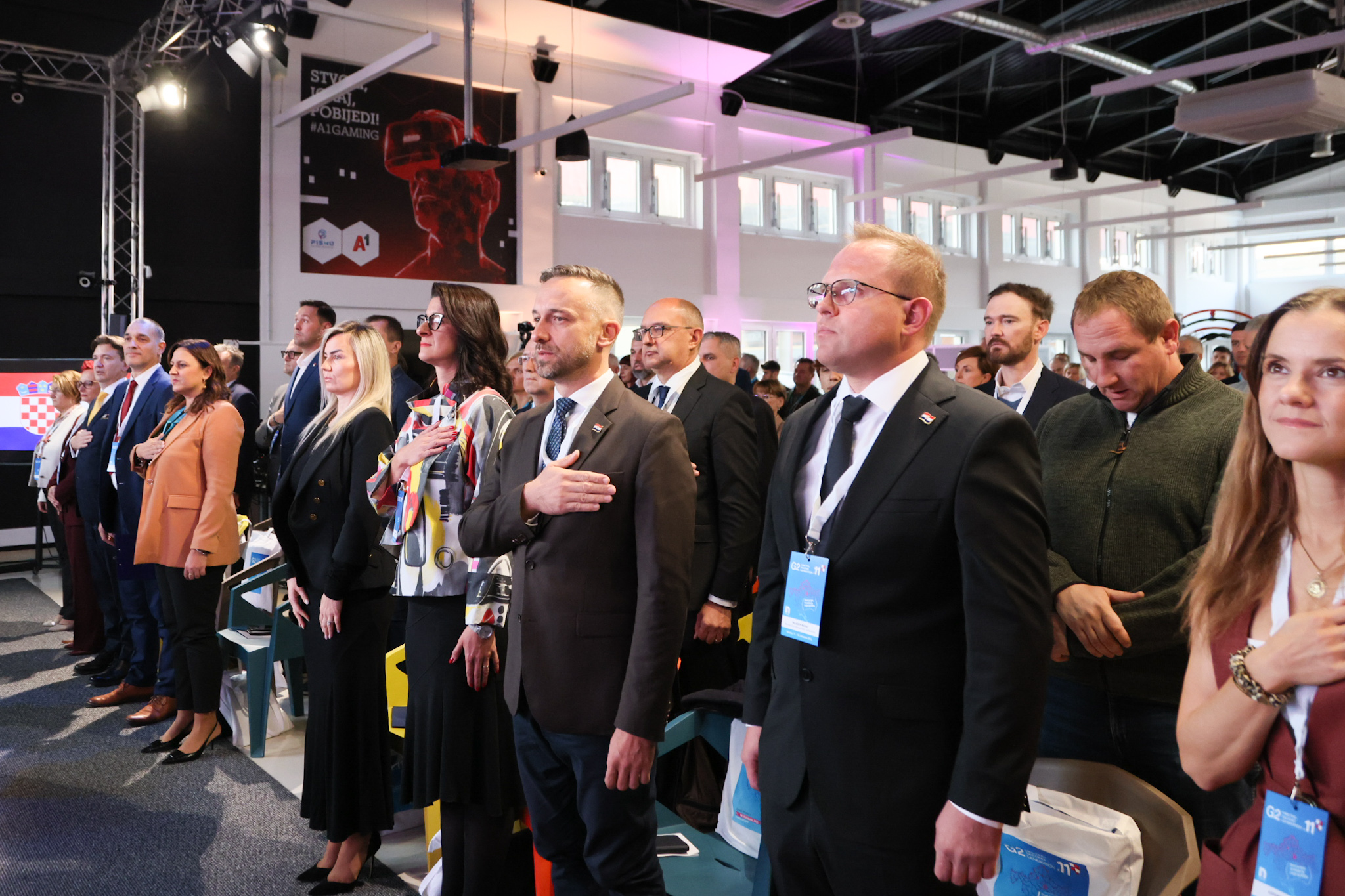
Sustainable Growth through Innovation and Diaspora Engagement
Martina Ciglević, envoy of the President of the Republic of Croatia and Deputy Advisor to the President for Economic Affairs, emphasised that sustainable economic growth must be based on investment in innovation, technology, and digitalisation, as well as in creating added value and a globally competitive economy.
“From North and South America to Australia, there are significant reserves of knowledge, experience, and capital that can drive Croatia’s growth. Small, open economies like ours cannot afford to simply observe global trends – we must become active participants in development through exports, business internationalisation, and investment in knowledge and excellence,” she said.
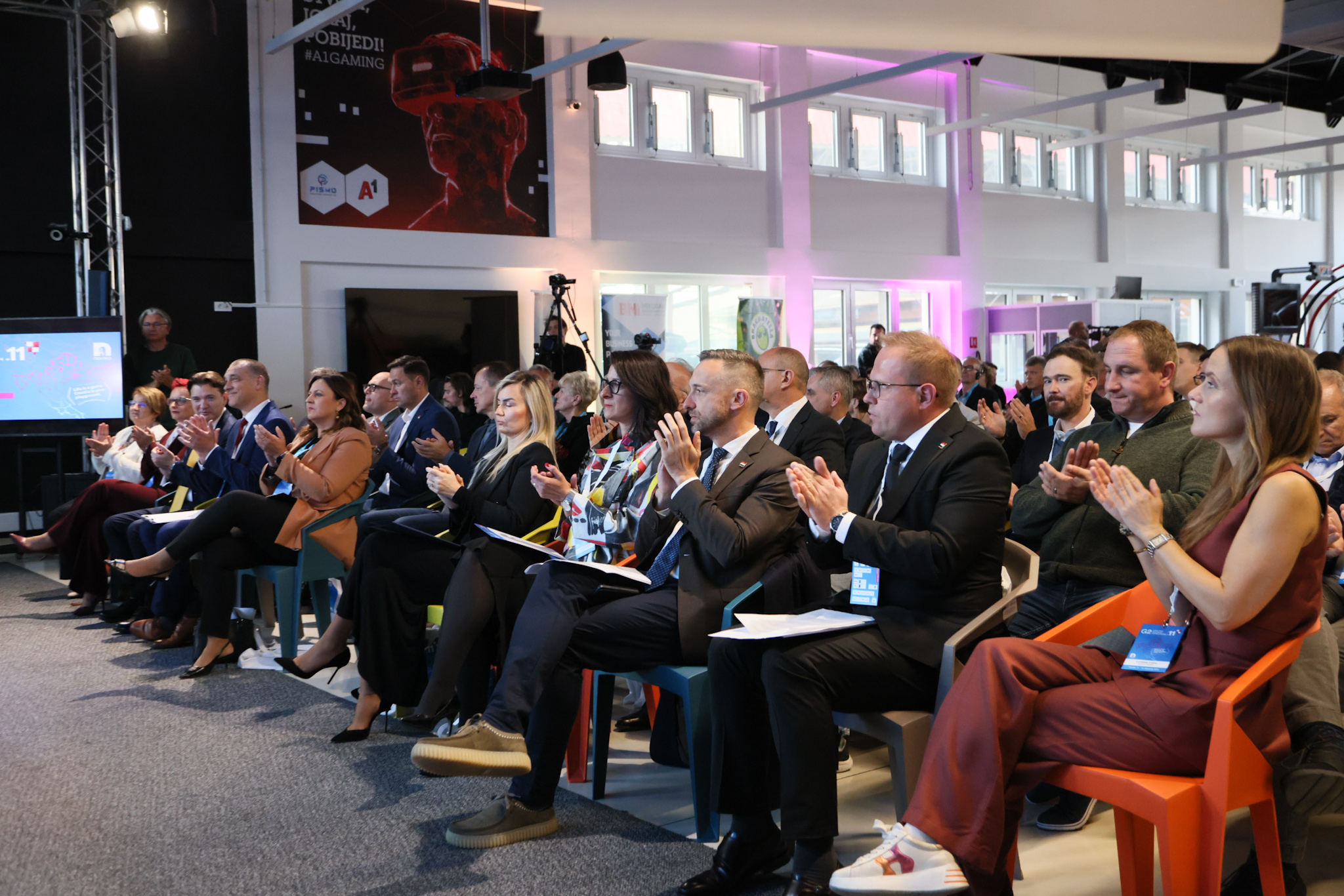
Novska as a Model of Success
Speaking on behalf of the Speaker of the Croatian Parliament, MP and Mayor of Petrinja Magdalena Komes highlighted Novska’s remarkable achievements, proving that even small towns can make great strides.
“Entrepreneurs are the backbone of the economy – they can lift or weaken a society. Croatia is now among the fastest-growing economies in the European Union, as shown by our rising GDP. To our entrepreneurs abroad – your help, cooperation, and advice are needed now more than ever,” said Komes.

Piletić: “Croatia Is Becoming a Country of Immigration”
Marin Piletić, Minister of Labour, Pension System, Family and Social Policy and envoy of the Prime Minister, underlined the importance of connecting homeland and diaspora, as well as investing in young people, families, and new technologies.
“Croatia has never been closer or more accessible to its diaspora, and the diaspora has never been more engaged in the daily life of Croatia,” said Piletić, adding that the government’s policy is focused on improving relations with Croats abroad and creating opportunities for young people worldwide.
He noted that government programmes and Croatian Employment Service initiatives encourage the return of young people from abroad.
“We are enabling those who are still uncertain – whether to stay in Europe or return home – to come back, as Croatia today is achieving strong macroeconomic results: record-high wages, employment, and support for entrepreneurs,” Piletić said.
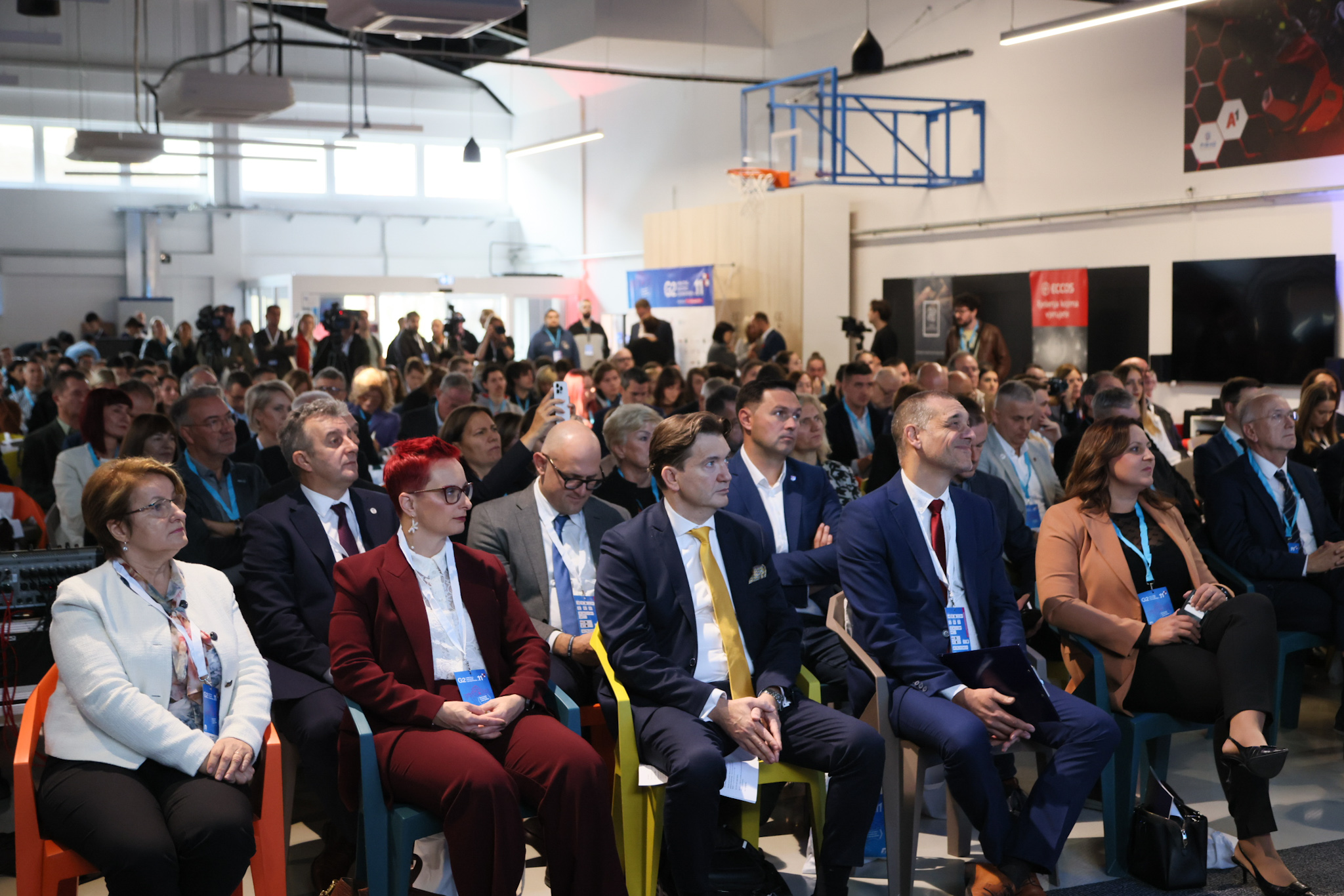
He added that the negative emigration trend reversed in 2022.
“Enough talk of emigration – it’s time for Croatia to become a country of immigration,” he concluded, thanking Meeting G2 organisers for “a project that awakens emotion and connects Croats, no matter the distance.”
Barać: “A Bridge Between the Homeland and the World”
State Secretary at the Ministry of Demography and Diaspora Mladen Barać stated that Meeting G2 has become a hub for connecting Croatia at home and abroad.
“Over 300 connected companies, hundreds of success stories and friendships are proof that this conference is not just an event – it’s a movement of unity, vision, and trust,” he said.

Barać added a personal note:
“We are the gamers’ generation – we grew up with computer games, and as a father of five, I see how technology shapes children’s development. What our young people need most is a sense of belonging and faith that they can realise their potential here, in Croatia. This country truly is a playground – challenging, beautiful, and full of opportunities – but we must build it on honesty, innovation, and solidarity.”
Kušmiš: “Novska Turns Ideas into Reality”
Marija Kušmiš, Mayor of Novska, said the town is now recognised as the centre of Croatia’s gaming industry and “a place where ideas become reality.”
She explained that over the past decade, Novska has transformed from a small Slavonian town into a hub of innovation, digital entrepreneurship, and new technologies.
“Our economy once relied on traditional sectors – wood, metal, construction, and textiles – but a few years ago, we boldly embraced new challenges. When we began developing gaming in 2018, it seemed like madness, but today we proudly call it courage,” she said.
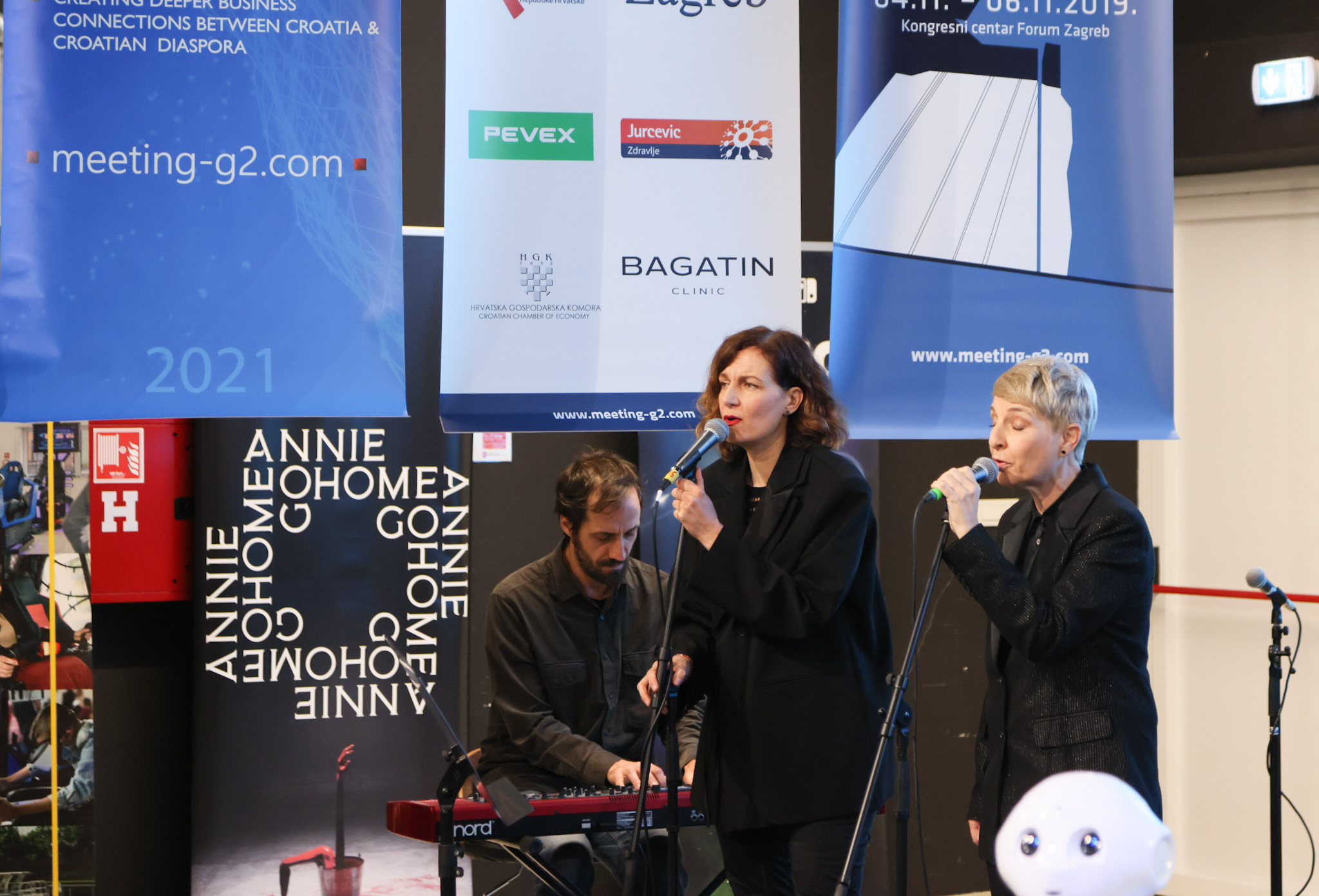
Meritas
Novska’s PISMO business incubator now hosts 80 start-ups, and the local secondary school has introduced Croatia’s first programme for video game development technicians. Construction is also under way on a €70 million Gaming Industry Centre, spanning nine hectares in Novska’s business zone.
“Here, ideas don’t stay on paper – they become real and successful business stories,” Kušmiš concluded.
Buterin: “When Homeland and Diaspora Unite, Croatia Grows”
Antun Krešimir Buterin, President of the Meeting G2 Association, said it was no coincidence that this year’s conference took place in Novska – the heart of Croatia’s gaming scene.
“Here, where tradition meets innovation, Meeting G2 aims to show that Croatia is not a small country but a land of great potential,” said Buterin. “Our mission from day one has been clear – to connect Croats worldwide through business, investment, entrepreneurship, innovation, and unity. If our footballers, from the homeland and diaspora alike, could reach the World Cup final together – we can do the same in business.”
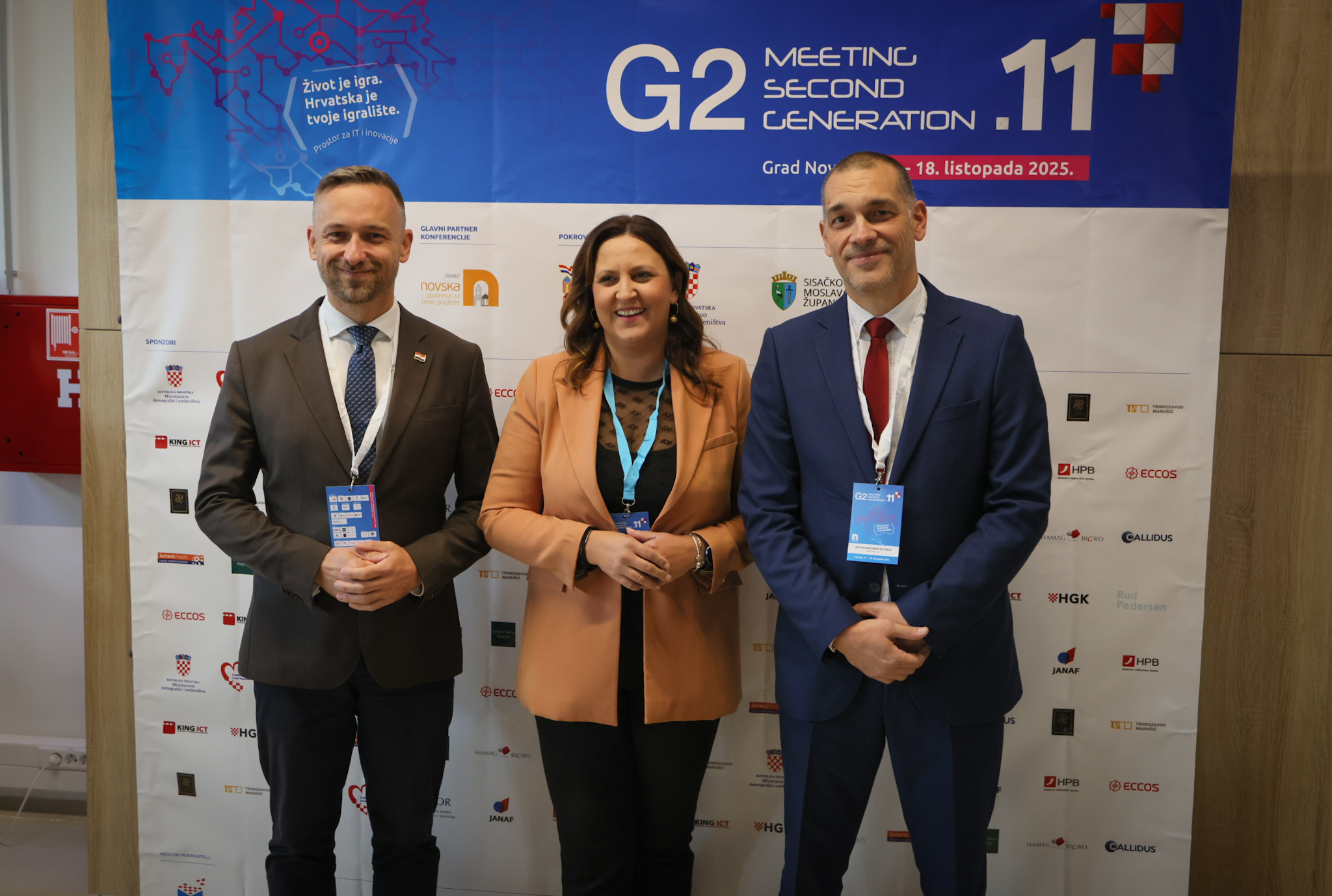
Marin Piletić, Marija Kušmiš, Antun Krešimir Buterin
How the Business Diaspora Sees Croatia – New Research
Meeting G2 also participated in a comprehensive study conducted among Croatian entrepreneurs in the diaspora, analysing their views on doing business and investing in Croatia. The research, carried out by experts from the University of Zagreb’s Croatian Studies in collaboration with sociologists, included respondents from Australia, Canada, South America, and Europe.
Sociologist Ivan Burić presented the findings at the conference, which show that the diaspora sees Croatia as a country of great potential, albeit with certain administrative and economic challenges. Many participants expressed interest in investing – and some in returning to live and work in Croatia.
According to data from the Croatian Bureau of Statistics, recent years have seen a positive migration balance – the third highest in the past 25 years – confirming the trend of return migration and renewed connection between Croatia and its diaspora.
Researchers noted that the Croatian diaspora holds vast knowledge, experience, and capital that, given a supportive business environment, could significantly boost the economy and accelerate national development.

The results revealed an almost unanimous consensus: quality of life and safety in Croatia were rated significantly higher than in most countries where respondents currently live. Participants also praised Croatia’s strong social advantages – close interpersonal relationships, family-oriented culture, and community support.
Living costs – particularly housing, food, and transport – were also positively rated, while income and business opportunities scored slightly lower. Public healthcare was rated as solid, though slightly below average.
Overall, the study found that most Croatian emigrants view Croatia as a pleasant and safe place to live, though not yet an easy place to do business. Many therefore stressed the importance of further developing business infrastructure, administrative efficiency, and investment stability to unlock Croatia’s full potential.
